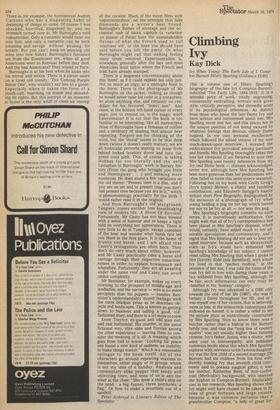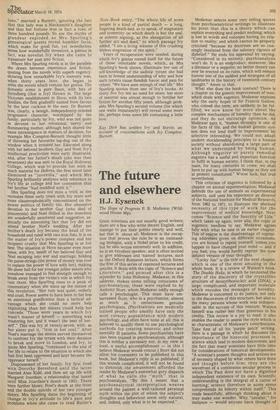Climbing Ivy
Kay. Dick
Ivy When Young: The Early Life of I. Compton-Burnett Hilary Spurling (Gollancz 0.80)
This is volume one of Hilary Spurling's biography of the late Ivy Compton-Burnett, subtitled 'The Early Life, 1884-1919.' It is a splendid piece of work, totally engrossing, consistently enthralling, written with great style, critically perceptive, and shrewdly acute in its psychological inferences. As distinct from those who knew the late Dame Ivy and have written and commented about her, Mrs Spurling never met her, and this places her in the unique position of not being swayed by whatever feelings that devious, elderly Dame inspired. In my own personal recollection, which followed the edited version of my noW much-drawn-upon interview, I stressed the ambivalence Ivy provoked among partisans and friends. Mrs Spurling thoroughly takes this into her viewpoint (I am flattered to note that Mrs Spurling uses twenty references from my Ivy and Stevie book — thirteen acknowledged, seven not, although here Mrs Spurling has been more generous than her predecessors who often failed to name this same source material). Following fast on my book were Cecily Greig's (Ivy's typist) Memoir, a chatty and rambling contribution, and Elizabeth Sprigge's hastily written short First Biography, distinguished bY the inclusion of a photograph of Ivy when young holding a pug on her lap which turned out not to be Ivy at all — nor was the pug.
Mrs Spurling's biography commits no such errors. It is marvellously authoritative. One might wish that all of Ivy's correspondence had been placed at Mrs Spurling's disposal, which would, certainly, have added much to her admirable speculation and commentary, and I regret that Mrs Spurling did not ask to hear my taped interview, because such an idiosyncratic voice as Ivy's would have enhanced Mrs Spurling's knowledge of her subject. I cannot resist telling Mrs Spurling that when I spoke to Mrs Dorothy Kidd (nde Beresford), with whom Ivy lived in that "perfect rooftop," in the presence of her son, I was told the name of the man Ivy fell in love with during these years, a fact withheld from Mrs Spurling, although, to be fair, such information can only truly be classified in the 'hearsay' category.
Although Ivy was advanced to a DBE only towards the end of her life (1967), she was in fantasy a Dame throughout her life, and as I was myself one of her victims, that is believing, more or less, in the aristocratic connections she endowed on herself, it is rather a relief to see the picture plain as meticulously constructed by Mrs Spurling. Nice to know there was a butcher rather than a bishop in the Burnett family tree, and that the "long line of countrY squires" was not socially higher than farming yeomen. Ivy's father, James, was a doctor, who went over to homoeopathy, and published numerous books about this which Mrs Spurling explores with relevance to his famous daughter. Ivy was the first child of a second marriage (Dr Burnett had six children from his first wife, thereby making Ivy that seventh child commonly said to possess magical gifts); it was• her mother, Katherine Rees, of non-conformist (Methodist) background, who inserted the hyphen in Compton-Burnett. ImplacablY cool in her research, Mrs Spurling shows that Ivy might well have chosen to be taken in bY tales of great fortunes and large estates, because it was common parlance that a grandmother Compton, "a lady of great for
tune," married a Burnett, ignoring the fact that this lady was a blacksmith's daughter
and that her fortune was in fact a loan of three hundred pounds. So are the myths of grandeur exploded as Mrs Spurling's genealogical quests reveal humbler facts, Which make for good fun, yet nonetheless stress how wonderfully inventive, a genius in fact, was novelist Ivy when she came to transmute her past into fiction.
Where Mrs Spurling excels is in the parallels she draws between experience and fiction, quoting from the novels with superb cogency, showing how remarkable Ivy's memory was, When thirty years later, she began to write the novels which contain her genius. The domestic scene is pure Ibsen, with bits of Strindberg (that is Ivy) thrown in. The large Victorian establishment in Hove, with its two families, the first gradually ousted from favour by the later cuckoos in the nest. Dr Burnett was, dearly, a benign, independently-minded progressive character, worshipped by the family, particularly by Ivy, who was not quite as devoted to her emotional, nervy and domineering mother, although both shared the same intransigence in matters of decision, for example Mrs Compton-Burnett thought little of throwing her favourite lap-dog out of the window when it irritated her. Educated along With her beloved brothers, Guy and Noel, Ivy's intellectual proclivities were early illustrated, and, after her father's death (she was then seventeen) she was sent to the Royal Holloway • College, which was to provide her with so much material for Dolores, the first novel later dismissed as "juvenilia," and which Mrs Spurling brilliantly analyses with reference to Ivy's life at college and her contention that her brother "had meddled with it."
Mrs Spurling does not miss a trick as she recreates these early years with Ivy more and more claustrophobically concentrated on the Power politics of family life. Her obsessive devotion to her brother Guy (who died of Pneumonia) and Noel (killed in the trenches) are wonderfully annotated and suggestive, especially the interesting fact that Ivy did not attend brother Noel's wedding. After her mother's death Ivy became the head of the household and ruled with two iron fists. It is on the matter of Ivy's power complex and her incipient cruelty that Mrs Spurling is at her best. The situation at Hove became even more tense, with Ivy, bereft of her beloved Guy and Noel escaping into war and marriage, holding the purse-strings (the power of money was ever to replace the power of love with her), making life sheer hell for her younger jollier sisters who somehow managed to find strength enough to break away from the victim's role in which Ivy cast them. Mrs Spurling rises to a peak of commentary when she sums up the nature of this revolution. "Her rule was quiet, orderly and cruel. Power seems to have been to her less an emotional gratification than a tactical advantage which she could no more help exploiting than her sisters could help but concede. 'Those were years in which Ivy wasn't master of herself — something was mastering her, and it wasn't the best of herself." This was Ivy at twenty-seven, with, as her sister •put it, "iron in her soul." After Noel's marriage the sisters nerved themselves to confront Ivy the tyrant with their decision to break and move to London, and Ivy, to quote Mrs Spurling, "continued to the end of her life to return to the situation in which she had first been oppressed and later became the oppressor herself."
Dispossessed of her family, Ivy first lived With Dorothy Beresford until the latter married Alan Kidd, and then set up life with Margaret Jourdain, a relationship that lasted until Miss Jourdain's death in 1951. There were further blows: Noel's death at the front and the double suicide of her two Olinger sisters. Mrs Spurling dates the beginning of Change in Ivy's attitude to life's pain and Problems when she came to read Butler's
Note-Book entry, "The whole life of some people is a kind of partial death — a long, lingering death-bed, so to speak, of stagnation and nonentity on which death is but the seal, or solemn signing, as the abnegation of all further act and deed," to which passage Ivy added, "I am a living witness of this crushing lifeless stagnation of the spirit."
Years of recuperation were needed, during which Ivy's genius rooted itself for the future of those inimitable novels, which,. as Mrs Spurling's book shows, illuminate her use of self-knowledge of the sadistic tyrant she had been in honest understanding of why and how such tyrants cause fiendish havoc and pain for others. "We have seen enough of real life," Mrs Spurling quotes from one of Ivy's books. At thirty five Ivy felt no need for more: her store of material was almost enough to fertilise her fiction for another fifty years, although probably Mrs Spurling's second volume (for which one waits impatiently) will reveal some more life, perhaps even some life containing a little love.
Kay Dick has written Ivy and Stevie, an account of conversations with Ivy ComptonBurnett.



































 Previous page
Previous page